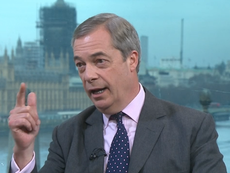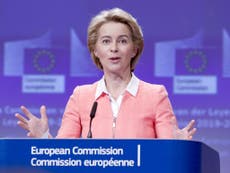Iran will force Boris Johnson to decide which is the more special relationship – the EU or the US
As trade talks open and the Iran crisis intensifies, the choice between Britain's two closest allies is becoming increasingly stark

Boris Johnson effectively opens negotiations on a trade deal with the EU today, as he meets Ursula von der Leyen for the first time since she became European Commission president.
Though both sides want a positive start to negotiations, tensions will not be far from the surface. Von der Leyen has dismissed as “extremely short” Johnson’s 31 December deadline. He will stick to his promise not to extend the transition period, during which the UK will remain in the single market and customs union. I suspect only a bare-bones trade deal, mainly on goods, will be done by December, no doubt at the last minute. But I think both sides will find a way to carry on talking about other issues, without formally extending the transition.
Today Johnson is reiterating his desire to diverge from the EU, rather than align with its regulations. He genuinely believes in divergence. But his tough rhetoric is about to collide with reality, and the need to ensure frictionless trade for manufacturing industries.
The most powerful lobby will not be business groups like the CBI but the new band of Tory MPs elected in the North and Midlands. They will get very nervous if job cuts or factory closures in car, aerospace and other firms are on the cards. As with the customs border in the Irish Sea, Johnson will try to mask it, but his party’s need to hold on to its new working-class voters will push him towards closer links with the EU than he envisages.
Another trade deal is also on Johnson’s mind today – with the United States. Ministers are urging him to negotiate that deal in parallel with the EU one, to put pressure on Brussels, although real progress is unlikely until the US sees the shape of the UK-EU agreement.
Johnson will be desperately hoping the temperature in the Middle East cools after Iran’s overnight attacks on two American bases in Iraq, in retaliation for the assassination of Qassem Soleimani. The prime minister knows a US trade deal could be jeopardised unless he fully backs Donald Trump on the Iran crisis. Despite his personal bond with Trump, Johnson knows he is unpredictable, and quite capable of making trade talks conditional on the UK’s supporting the US in the Middle East, or on the UK’s decision on whether to permit Chinese tech giant Huawei to provide the UK’s 5G mobile network.
The last few days are a reminder that the UK often has more in common with its neighbours across the Channel than its supposedly closest ally across the Atlantic. Like Johnson, EU leaders must perform a very difficult balancing act on US relations. As one EU diplomat put it: “We’re on a tightrope, with no balancing pole and a minefield below.”
Crucially, the carefully-worded joint statement issued by Emmanuel Macron, Angela Merkel and Johnson did not support the US strike against Soleimani. Behind the scenes, the mood in Paris and Berlin is hardening against Trump. They are preparing to condemn Washington if Trump reacts to the Iranian retaliation with even greater force.
If that happened, Johnson would in grave danger of falling off the two horses he is trying to ride. Trump might ask him: “Are you with us, or against us?” Johnson’s efforts with France and Germany to keep alive the flickering flame of the 2015 nuclear deal would be under severe strain.
British diplomats and politicians have long encouraged the image of the country as a bridge between Europe and America. This vision naturally appeals to Brexiteers who dream of a “Global Britain” after the UK leaves the EU. Yet this dream has been given a cold shower by the current crisis.
Which way would Johnson jump if he were forced to choose? The pull of Washington would be strong, perhaps overwhelming. It was strong enough for the Europhile Tony Blair as the US prepared to invade Iraq in 2003, and a European solution might have been possible.
If it happened again during this year’s EU trade talks, the UK would pay a price for turning its back on its neighbours. The EU wants the UK to remain in its diplomatic orbit, to maximise its influence in a world dominated by the US and China. In a speech at the London School of Economics before her meeting with Johnson, Von der Leyen urged the next generation of Britons to “choose collaboration over isolation,” rightly arguing that the UK would then enjoy more influence in the world; and geopolitical clout is surely where the national interest lies. Outside the EU, the model would be the sensible co-operation by the UK, France and Germany on Iran, without being drawn into EU foreign or defence policy, or Macron’s “more sovereign” Europe.
In the very early days of his “new government”, Johnson has discovered that another French president, Charles de Gaulle, was right to say: “To govern is always to choose among disadvantages.”





Join our commenting forum
Join thought-provoking conversations, follow other Independent readers and see their replies